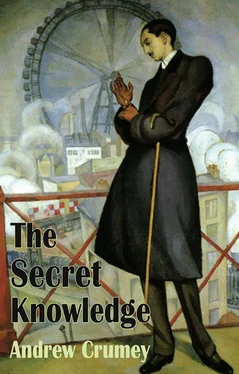“Jews?”
“Mostly, yes; also some agitators. The French police know about them. They don’t have exit visas.”
Suner follows it all perfectly well, given that the scenario is an everyday occurrence, yet rubs his chin at his guest’s last remark. “The police let them go up the mountain, though they lack visas?”
Carreau nods. “The civil guard on this side have also been informed. The refugees will be brought to your hotel to stay overnight, then returned.”
This is unexpected news. Suner had immediately known, when Monsieur Carreau spoke the other night about “shipping interests”, exactly what was meant by the term, the present major item of cross-border trade being people, usually on their way through Spain to Lisbon and then America. The restaurant of his small hotel, in a fishing town notable only for its strategic location, is the regular haunt of under-cover Gestapo men, informers and fugitives, all offered a warm welcome and a hearty meal as long as they can pay for it. But Suner is not used to having his establishment serve as a detention centre. “Who’ll pay the bill?” he asks bluntly.
“They are persons of means,” Carreau assures him, unable to conceal a note of disgust at such plebeian concerns. “You will not be left out of pocket.”
“Then I shall assist the authorities in whatever way I can,” Suner avers, touching his moustache where a bead of sweat has lodged, and bowing once again when monsieur moves towards the dining-room door. “Pablo will be pleased to tell you about tonight’s dishes, and may I cordially recommend the sea bass.”
Such pretensions are typical of Suner and the grimy pension he runs. Monsieur Carreau finds the dining room almost deserted; a young couple huddle in one corner, furtively studying the menu, while in another a gaunt man sits alone with a glass of wine, fingering the stem with a jilted look that could be the poor mask of a spy. Carreau’s “usual” table is out of earshot, conveniently close to the gramophone that on his last visit he requested to be turned down. Pablo must have remembered; it might on this occasion be necessary to ask for a raising of volume. Yvette watches her husband’s approach impassively. “Have you decided yet?” he asks her, sitting down.
“The waiter said something about fish and I nodded, then he went away. I don’t know if that constituted an order.”
Carreau laughs and takes her hand which lies on the crumb-specked table. “Darling,” he says fondly, but the disdainful lowering of her eyes makes him trail off.
Yvette listens to the music, murmuring half-forgotten lyrics to the dance band’s melody, then stops and in a low voice says, “When do you think they’ll get here?”
Carreau isn’t sure. “I hear that the walk over the mountains can take ten, maybe twelve hours. Depends how fit they are. And how long the police hold them.”
The door springs open; it is a new group of diners, all Spanish in appearance: two men in suits, a smartly dressed woman, a boy of nine or ten. The waiter comes and speaks to them rapidly and with familiarity; Yvette is unable to follow but Carreau listens carefully, and seeing his wife’s anxiety says softly to her, “It’s not them. We’ll know when we see them.”
Outside, in the lobby, Senor Suner is speaking quietly on the telephone to the local chief of police. “Yes, Juan, I have rooms for them, but I hope this isn’t going to be a regular occurrence. I don’t want my hotel being turned into a prison.”
And at the other end of the line, the police chief momentarily puts his hand over the mouthpiece to tell the deputy waiting at his desk, “Take them now.” There they are, sitting on wooden chairs in his office, five women, a teenage boy and an overweight spectacled gentleman with a black leather briefcase at his feet, all exhausted from their walk and dumbfounded by their treatment. It is as if the rules have suddenly been changed, just for them.
Yvette flicks away a crumb from the tablecloth. “You do promise me they’ll go free?”
“Of course,” Carreau nods. “That’s the arrangement.” He leans closer to his wife. “We’re dealing with small-town minor functionaries; the only thing they understand is the gleam of gold. Everybody’ll get what they want.”
“But the refugees…”
“They want to leave France illegally and we’re helping them do it.”
“That’s not how it must seem to them right now.”
“It’s the way it has to be.” The music stops, and while Pablo goes to replace the record on the gramophone, Carreau glances cautiously towards the silent man with the wine glass. Only when an operatic aria strikes up does he resume speaking. “You know I’m doing this for you, Yvette, don’t you? All these years, all the searching and gathering, all the running and hiding, it’s been for you.”
“I know that’s what you think, Louis.”
“It’s what we both know. And now we shall add another piece, we shall draw another step closer. It’s the only way. He needs something we can give, he owns something we want.”
Yvette looks at him with time-worn sadness. “But a step closer to what, Louis? To happiness? To the grave? You say it’s all about protecting me…”
“Yes,” he snaps, unable to suppress his impatience. “It’s about not letting them do to you what they did to Pierre.”
“And I thank you for it,” she whispers, “you know I do, I always have. But we’re getting old. You seem as determined as ever to go on, you’ll never rest until you’ve put every single piece of the jigsaw together; yet I, Louis, I am tired. If they caught me right now, yes, even if that fellow over there with his empty glass should turn out to be one of them, and if he should come at me with a dagger as soon as we get the documents, you know, Louis, I’m not even sure I’d have the strength to fight. Perhaps I’d really want him to slit my throat, perhaps I’d feel relief at last. I never asked for any of this…”
“I know, darling.” Carreau takes her hand again. “But you’re the one Pierre chose. No one can alter the path of destiny.”
It is a word she has heard too many times. Walking as a young woman in the park nearly thirty years ago, waiting for Pierre to arrive, the word was as thrilling as the big wheel they rode on; destiny meant marriage to a genius, or so she thought. What she got instead were a few relics: a piano score, a lock of hair, the fragile orchid he wore that terrible day — she even thought she could see a spot of blood on it. And the letters, the warnings, the strange and threatening events that Louis, her brave warrior, arrived to rescue her from. He’s been rescuing her ever since. Her life has been a long and wearying journey over a mountain, with no indication of who her pursuers really are, or why they want to harm her.
“What’s happening to those poor Jews,” she murmurs, “is what I’ve had to endure.”
“Then you have to stay quick-witted and alert, like them.”
Pablo brings their food; the sea bass is a fish much like any other, made palatable to Louis by the wine that accompanies it, while Yvette finds solace in the succession of records that whirr themselves to completion on the machine beside her.
“ The Magic Flute ,” she says at one point. It’s the Queen of the Night’s aria; tears come to her eyes.
“It’s beautiful,” Louis says politely, though to his ear it is indistinguishable in quality from whatever he tapped his toe to not long before.
“Pierre always used to say to me…”
“I know, darling, you’ve told me. He always used to say that in The Magic Flute everything’s the wrong way round: it’s Sarastro who seems evil and the Queen of the Night who’s wronged. Yes, that was very wise.”
Читать дальше











